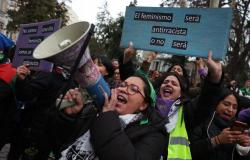Since Donald Trump's victory in the American presidential election, California has been in crisis, torn between Republican separatists who are campaigning for the creation of a new independent state, and Democratic forces who are organizing to preserve their rights, which they consider threatened.
Will the United States soon have a 51st state? This is the desire expressed by Republican separatists in California after Donald Trump's victory in the American presidential election.
Strengthened by their honorable local result, obtaining the majority of votes in 8 of the 54 counties of the state previously won over to the cause of Joe Biden, the radical Republicans are demanding a separation of California into two distinct states.
An unlikely scenario which has nevertheless already happened in the history of the United States.
Two precedents in history
Few observers had anticipated it: a red tidal wave hit the United States on November 5, on the occasion of Donald Trump's victory in the American presidential election. Including in California, a Democratic bastion known to be impenetrable, where Kamala Harris was born and spent her entire career.
Since obtaining a majority of votes in part of the state, Paul Preston, founder of the New California State movement, from the conservative fringe of the American right, has called for secession and to redraw the map of the United States. United to create a 51st Republican state, independent of the Democratic part of California.
At issue: the fundamental differences between Democrats and Republicans on Donald Trump's program on the subject of immigration, the climate, abortion and even on economic subjects. However, this is an unlikely scenario since it requires the agreement of existing local legislative assemblies, with Democratic majorities.
But not impossible since there are precedents in the history of the United States, notably with the creation of Kentucky, emancipated from Virginia, and Maine, with the agreement of Massachusetts.
“protect the rights of Californians”
The Democratic forces led by Governor Gavin Newsom and Los Angeles Mayor Karen Bass therefore intend to organize “legal resistance” to “protect the rights of Californians” in the face of Donald Trump’s program.
This is the case for the national ban on abortion, the revocation of California's right to regulate its own greenhouse gas emissions, the end of protection for immigrants who arrived in the country illegally when they were children, the questioning of gun control laws or even the decline in the civil rights of transgender people. Measures that all threaten California law.
Another subject of concern: the economic aspect. The most populous state (40 million inhabitants) and richest (15% of national GDP) of the United States which, if it were a country, would be the 4th economic power in the world, also wants to preserve its interests financial, closely linked to the work of immigrants, under temporary or illegal visas. The Trump administration's bill aimed at their mass expulsion could thus destabilize its economy, particularly in the construction, agriculture, hotel and healthcare sectors.
an extraordinary parliamentary session
As a reminder, vis-a-vis the federal government, each state retains its own criminal and civil law. Faced with this push from the most radical Republicans, the Democratic governor of California, Gavin Newsom, therefore organized an extraordinary parliamentary session this Monday, December 2 in Sacramento.
The objective: to decide on a plan and a “budget to safeguard California’s fundamental rights”. The governor is banking in particular on the solidarity of wealthy donors from Silicon Valley and Hollywood to find the necessary funds.
For his part, Jim McDonnell, the boss of the legendary LAPD (the Los Angeles police), affirmed that he was ready to disobey the orders of the Trump administration, by “protecting the immigrant population” and by not “cooperating with mass deportations “.
A speech supported by the mayor of the city, Karen Bass, who recalled that Los Angeles is “a city of immigrants”. During Donald Trump's first term, California had already filed 120 actions against government bills deemed “unconstitutional and illegal.”







